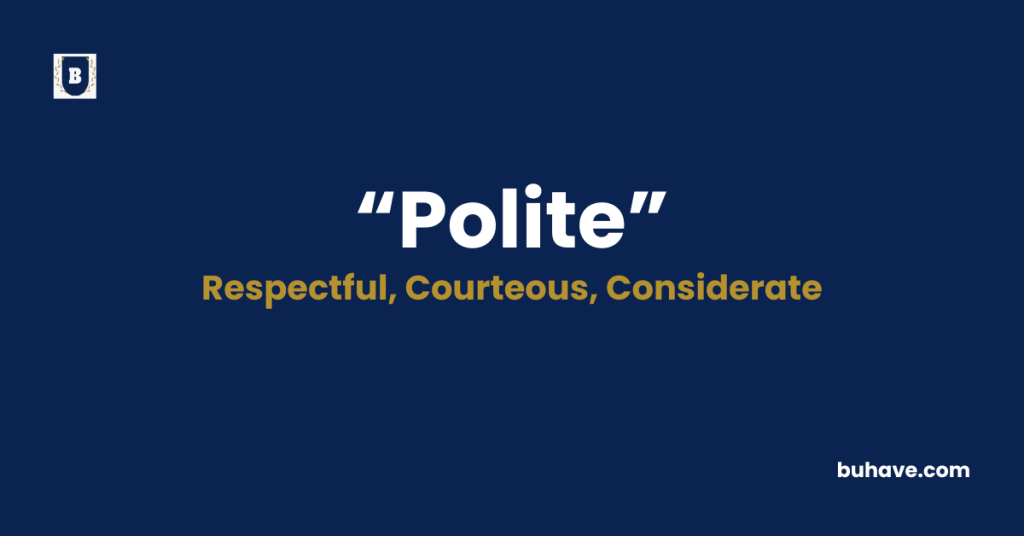The word ‘Polite’ (Adjective) describes someone who shows good manners, courtesy, and respect in behavior and speech. In this guide, you’ll learn the full definition, synonyms, antonyms, etymology, and real-life examples of how to use ‘Polite’ correctly in sentences.
Polite Explained in Depth
A complete and detailed guide to the word Polite including meaning, definition, examples, etymology, synonyms, and antonyms.
Meanings of Polite
The word polite refers to behavior that reflects respect, courtesy, and refinement in interactions with others. When someone is polite, they demonstrate awareness and sensitivity to the feelings, needs, and rights of other people. This includes saying “please,” “thank you,” waiting one’s turn, acknowledging others with eye contact or a greeting, and generally behaving in a way that promotes peaceful and positive communication. Politeness helps maintain harmony and prevents unnecessary conflict, making it a fundamental social skill in every culture and community.
Being polite does not mean being overly formal or distant; it simply involves expressing kindness and thoughtfulness in everyday situations, whether at home, in public, or at work.
In modern society, politeness is essential to building trust, fostering cooperation, and creating an atmosphere where people feel safe and respected. It serves as a bridge in diverse social settings, allowing people of different backgrounds and perspectives to communicate effectively. Children are often taught to be polite from a young age as part of their moral and social education, which later becomes an integral part of their character.
From small gestures like opening a door for someone to more complex forms of respectful disagreement, politeness can make all the difference in how we relate to one another.
Definition
Polite is defined as showing or expressing respect for others in speech or behavior; acting in a manner that is socially correct, considerate, and well-mannered. It implies a conscious effort to be civil and gracious, even in situations that might be tense or unfamiliar. Politeness is not just about saying the right words but also about embodying an attitude of respect and empathy.
In practical terms, being polite includes using courteous language, showing appreciation, exercising patience, and being mindful of others’ space and time. For example, a polite person might hold the door open for someone behind them, refrain from interrupting when someone else is speaking, and respond with calmness rather than anger when faced with disagreement. Politeness is deeply embedded in cultural norms, which means that what is considered polite can vary significantly from one society to another. Still, the core principle remains universal: treating others with dignity and care. In professional and personal contexts, politeness builds credibility, earns respect, and facilitates smoother, more constructive interactions.
Etymology
The etymology of the word “polite” is rooted in the concept of refinement and smoothing out roughness—both literally and metaphorically. It originates from the Latin word politus, the past participle of polire, which means “to polish” or “to make smooth.” In this original sense, it described something that had been physically refined or made more aesthetically pleasing. The transformation of this concept from physical to behavioral refinement happened gradually over centuries as societies placed increasing value on civility and decorum.
The term passed into Old French as polir and Middle English as polite, initially retaining its literal sense of smoothness or elegance. Over time, as the idea of refinement extended from objects to people’s behavior, the meaning of “polite” shifted to describe someone whose manners were as refined and smooth as polished silver. By the 18th century, “polite” was widely understood to mean someone who was cultured, well-bred, and socially adept. It became synonymous with the ideals of the so-called “polite society,” where etiquette, good manners, and graceful interaction were highly valued. Today, the word still reflects its original sense of polish—not on metal or stone, but on the way we interact with each other, aiming to smooth over social friction and create more pleasant connections.
Example Sentences
- He always speaks in a polite tone, no matter how stressful the situation.
- She was polite enough to wait until everyone had been served before eating.
- The teacher appreciated how polite the students were during the presentation.
- Even though he disagreed, he remained polite and respectful in his response.
- They wrote a polite letter to the landlord requesting repairs in the apartment.
Polite Synonyms
- Courteous
- Respectful
- Civil
- Gracious
- Well-mannered
- Considerate
- Tactful
- Well-behaved
- Gallant
- Refined
Polite Antonyms
- Rude
- Impolite
- Disrespectful
- Insolent
- Ill-mannered
- Uncivil
- Brash
- Discourteous
- Blunt
- Obnoxious
FAQs about Polite
Here are some frequently asked questions (FAQs) about the word “Polite”
1. What does “polite” mean in simple terms?
Being polite means treating others with kindness, respect, and good manners in both what you say and do.
2. Can politeness vary across cultures?
Yes, cultural norms influence what is considered polite. Actions that are respectful in one culture may not be seen the same way in another.
3. Is politeness important in the workplace?
Absolutely. Being polite at work helps build a positive environment, improves teamwork, and prevents misunderstandings.
4. What are some examples of polite behavior?
Saying “please” and “thank you,” listening attentively, not interrupting others, and apologizing when wrong are all examples of polite behavior.
5. Can being polite make a difference in relationships?
Yes, politeness fosters mutual respect, trust, and better communication in both personal and professional relationships.
6. Is politeness the same as kindness?
Not exactly. Politeness is about showing good manners, while kindness is about showing genuine care and compassion. However, they often go hand in hand.
7. Can politeness be taught?
Yes, children and adults alike can learn polite behavior through education, modeling, and practice.
Explore more P words
Positive words that start with P
Negative words that start with P
Names that start with P
Nouns that start with P
Verbs that start with P

















